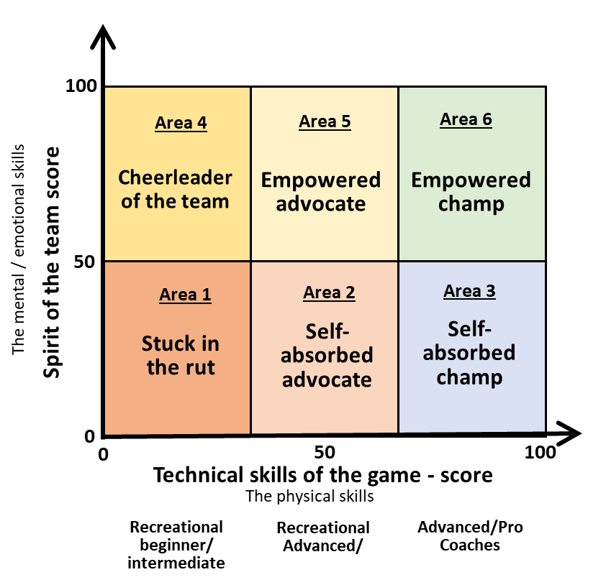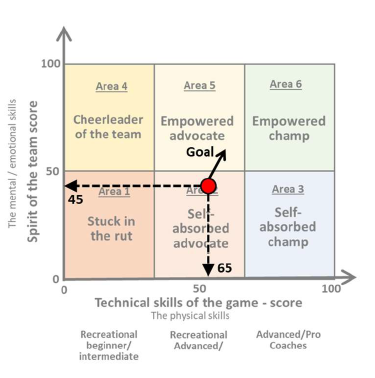Area 1 – “Stuck in the rut “describes a player who has low technical skills and also does not perform well in the group.
Often the player shuts herself/himself up from the group while blaming the predicament of the group and “others”. It is difficult for the player to advance in skills and to reach her/his best skill potential since there are communication barriers. The player might also not be able to take advantage of effective skill training and feels stressed and excluded.
Help: Good communication and team engagement coaching helps the player to advance in skills and feel more cared for and valued which improves the learning potential.
Area 2 – “Self-absorbed advocate” illustrates an advanced recreational player who is focused on improving his/her own skill and being able to win games. Engaging with other players to help them advance in their skill level does not come easy to him/her or he/she might avoid supporting others out of competitive thinking. Winning is at the center of focus and what others feel is most likely not of great interest. The player might be generous at times but usually only if he/she is winning. Wrong line faults are typically called more often and there can be a feeling of failure when the player loses against other players und his perceived skill level.
Help: The player will be helped to gain the proficiency of connecting to other players and celebrate his/her and other players victories.
Area 3 – “Self-absorbed champ” illustrates a player who has advanced to a high technical skills level but who lacks good interactions with peer players and the team. While the immediate goal of winning can be achieved, the feeling of being incorporated in a team of peers lacks and so does the ability to fully engage in the game. The description of “champ” suggests that the individual achievement is more pronounced than the experience of valuable relationships and being member of a group who enjoys the game. But even champs need others to glow, and coaches can take advantage of support to go beyond the physical aspect and really coach their students.
Help: The player will greatly benefit from ways to connect better and overcome possible isolation.
Area 4 – “Cheerleader of the team” stands for a player who is embracing the team or other players and adds to the team spirit. While the player values that interactions he/she needs to invest more into developing technical skills of the game so that the team can engage in higher quality play. Since the player sees the value he/she adds to the group, he/she will be open to taking advantage of the support of the team to succeed in acquiring better playing skills.
Help: The player will benefit from support from teaching lessons from instructors and by the team to set up playing situations that foster technical playing proficiency.
Area 5 – “Empowered advocate” illustrates a recreational player who has reached an advanced skill level but has not reached the pro height of the pickleball game. The player is generous and does not dwell on his /her proficiency and on the ability to win against less advanced players. He/she reaches out and helps other players to advance in skill level and sees when other players have difficulties regarding physical playing skills or get frustrated when skills are not improving as fast as they wish.
On and off the court the player will be heard regularly encouraging other players with a “great shot” or “do not worry”. Having an empowered advocate on you team is a great asset and makes all players happy.
Area 6 – “Empowered Champ” is the pinnacle of a player’s ability to add value to the game and build enduring relationships with peer players. The player has acquired high technical skills which enable him/her to play at advanced levels.
Yet, the player has the mental capacity to relate and play to players who are not as good as him/her. This type of a player is confident to gauge how his/her skill level can help less skillful players to grow and provide an encouraging environment which helps other players to thrive. Empowered champs are few, but they add enormous value to the game and the community of players.



